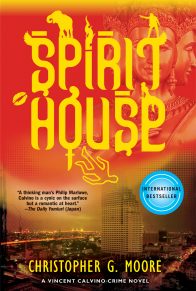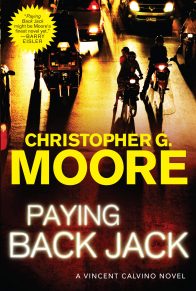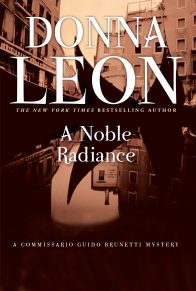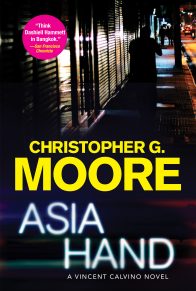Thais have a saying about a frog living inside a coconut shell. The frog believes that the world inside the shell is the whole universe. In the private investigation business, Vincent Calvino had clients who were like the frog. What they saw from inside their shell blinded them, made them unable to solve a problem. So they hired Calvino. He knew the drill. Shells offered comfort and security. Leaving could be a dangerous business. Calvino’s froglike clients paid him to venture into a larger existence and to find out and report on the wiring of relationships and places and events, how they were linked and fit together in networks.
Drop two alpha spiders into a coconut shell and watch as things become infinitely more interesting. It’s still a shell, but the dynamics change from security and comfort to fear and suspicion. No matter that the shell looks the same; it isn’t the same place. The landscape is colored with a different set of the emotions. Silky webs mark turf, and spiders patrol their turf.
He’d done investigations for spiders, dragging prey back to their shell. Spiders paid well. As far as Calvino would make out, there was no Thai saying about a couple of large, hairy spiders spitting poison at each other in a coconut shell, but when he mentioned it to the Thais, they laughed and said that he knew too much about the country. When a Thai said that, it wasn’t a good thing for a farang. It wasn’t a compliment; it was a warning.
When a potential client walked into his office, Calvino studied the face and body language for some sign: was this person a frog or a spider? Sometimes he knew the answer after the first blink.
Other times, he wasn’t so sure. Danielson was a case in point. Calvino collected evidence of a drug piracy operation for this client, an American lawyer who was a partner in a Bangkok law firm. Someone had banged on the side of Danielson’s coconut shell and two fearful eyes had popped up at the edge and peered out. Life outside the shell was unstable, dangerous, and darkened by powerful forces. Andrew Danielson was a frog, another borderline ordinary, boring, and predictable frog working in a spider’s nest. That’s what had confused Calvino. The fee Danielson agreed to pay had been excellent. And there was another reason: the job would help Calvino with an application he had been working on. His mother had sent him an advertisement for a senior investigator job at the World Health Organization. He had never heard of the UN hiring a private investigator, but it made sense. Someone had to investigate where the next pandemic was brewing, who was manufacturing fake drugs—pills filled with chalk and powdered milk—or who was napping at regional headquarters. His mother said Calvino was perfect for the job. He would have a steady income, a steady job, and he would work in New York, closer to her and the family.
His mother had written the letter from inside her retirement home. It was a strong letter, which had cursed the memory of Galileo Chini, the Italian painter, long dead, who had left an everlasting impression on Calvino when he was fourteen years old. He checked out the WHO. It was a legitimate position on offer. With a major bust of an illegal drug piracy operation, how could the WHO not hire him? Vincent Calvino, it seemed, also lived deep in the shell of Bangkok.
On his wall was a framed reproduction of Galileo Chini’s The Last Day of the Chinese Year in Bangkok, 1912. The original oil painting, which was huge, hung in the Pitti Palace in Florence. Colonel Pratt had given him the reproduction as a birthday gift the previous year. Many years before, in New York City, they had met at a lecture on Galileo Chini and his Siam paintings. Calvino looked up from his mother’s letter at the painting. The people, the street, and the dragon glowed in a burnished red hue, shimmering as if caught in the afterglow of flares, tropical hot red as if on fire. The dragon danced, and Chinese in pigtails stood in front of the huge dragon head, as if accepting their fate, waiting to be swallowed. The mind echoed with the sound of gongs and drums and, with each move of the dragon, the tinkling of hundreds of bells.
A new dragon was on the streets of Bangkok. It was a time of great disturbance and conflict. A time of tyrants, a time of visionaries, a time for fools, pretenders, wannabes, and gentle souls, confused and isolated—lives tossing and turning inside their coconut shells. Calvino had pulled out a small victory, one that would please Andrew Danielson but also a feather in his cap that would look good when he sat down with the WHO officials, who would ask what he had done lately for the health of the world. As he entered the narrow dead-end sub-soi to his office, he did one of those end zone dances as if he’d scored a touchdown. Looking at his watch, it was just after 5:00 p.m. He thought about the money Danielson would give him. It was more than just another all-cash deal. Sure, he would deliver the videocassette of the piracy operation and get ten grand. But he’d also receive a letter of commendation on Andrew Danielson’s letterhead, and a letter from the drug company letting the WHO know this is the guy they need to do their investigations for them.
But in the meantime, Calvino had violated a primary operating principle about fees. Calvino’s law: Always get your money first. He had a set speech he gave to clients:
I want up-front money. I’ll forget about up-front money if you’re willing to have an up-front tattoo. My name tattooed on your right arm with a lot of black magic Chinese symbols for betrayal underneath. I’ll look at the tattoo and I’ll settle for “hei mo fa” under my name. Do that and I’ll let the upfront dough ride.
Danielson never got the tattoo speech. He was a lawyer. Ten grand was nothing for a partner in a Bangkok law firm. And Danielson wanted a performance guarantee. Calvino’s mother wanted him to go for the WHO job, so he swallowed hard and didn’t make his speech. That was fine. Everything had worked out. He had the evidence.
*
Calvino heard a woman’s voice and tried to separate the signal from the noise. Why was the woman crying? He stopped and looked around at the buildings on both sides; he couldn’t locate where the crying was coming from. The sound of distant wailing suddenly drifted into wet sobs. A woman’s voice shuddering, as she recharged her lungs for a new round of even more powerful, mournful notes of sadness. This soulful female moan of despair troubled Calvino. He rubbed the pain in his shoulder. He knew something about pain.
I’m getting old. Too old to be hiking around a strange neighborhood with camera equipment, trying to avoid being noticed. A desk job was just what the doctor prescribed. Ease up, lay back, do the investigative work by computer, hire locals to do the footwork. He had his new job all figured out in his head. Despite the horseshoe kick of pain, Calvino felt in good spirits. High and good, the way a man feels after making a big score, bringing it home, and showing the whole tribe that he might be getting old but can still do the job.
He shifted the weight of the camera bag from one shoulder to the other. On his mother’s side of the family, there was a history of arthritis; it was one of those built-in traits, like the mechanics of a ticking time bomb, that waited for the right age, the wrong moment, to spring a surprise. Click, detonate, then a surprise: wave after wave of electricity shooting through the shoulder.
Like the crying woman was a surprise. The sound of her sobbing, half muffled by the traffic from the street, registered on his consciousness. He walked ahead. The sound came closer, coming from the direction of his office. No sound disturbed a man as much as hearing a woman’s deep-throated bolts of pure grief. Cursed moans delivered to the world in a universal language of sorrow and loss. It was the soundtrack on the international news every night, but it was never the same as hearing it live. Calvino again shifted the weight of his camera bag from one bum shoulder to the other, the two working like a handicapped relay team looking to cross the finish line and collapse. The video camera, backup batteries, and the other gear felt as if they were pulling him to the ground.
A young ying in a polo shirt and loose-fitting pants shot out of the shadows. Her face, a tear-streaked mask twisted by fear, looked terrified. She ambushed Calvino, grabbed him, pulling at his arm, the arm attached to the shoulder with the shooting pain. He cried out but his wail of hurt didn’t stop her. Long red fingernails dug into his arm. She tightened her grip, dragging him along until they reached the front of the massage parlor. Then she pushed him through the entrance and into the swamp-green tiled reception room, and walked him down a corridor with orchid wallpaper, under a permanent set of flashing Christmas tree lights, and up a flight of stairs. The decor could have been copied from McPhail’s room, exhibiting, like his friend’s home, a gangster’s flair for year-round Christmas.
Calvino’s office was on the fourth floor of the building. The office below his had been vacant for more than a year. The One Hand Clapping massage parlor used the first floor to hook customers before reeling them in to the second floor for a massage. After dark, the red and blue neon sign spelled out the name in cursive script above the door. Some might have called it artistic. A neon image of a woman’s hand, the fingers splayed; each finger lit up, red neon for the fingernails, one light at a time until the entire hand was visible, glowing out of the blackness. With slender fingers this sensual hand beckoned to visitors.
When the sign was switched off, the hand didn’t move. But even when the neon sign was on, the hand didn’t look like it was clapping; it took a leap of imagination to see that. The name and the hand were the first things Calvino’s clients saw when they stood at the staircase leading to his fourth-floor office.
A couple of clients had been amused by the presence of One Hand Clapping below the office of a private eye. Others stopped in their tracks, turned, and walked out of the sub-soi, phoning later to cancel their appointments, saying they had resolved their problems. A massage parlor on the first floor was hurting his business. Tuesday would be the three-month anniversary of the massage parlor’s opening. Business hadn’t been good in that period. Yings had stood out front, handing out discount coupons to potential customers. His clients sometimes would lay one on his desk and ask if the discount applied to his services. Life was a series of small humiliations.
The area in front of the massage parlor, empty and quiet, normally bustled with yings advertising their services. But at the moment it was deserted, except for the ying who now had him in an arm lock and was pleading for help, her eyes wild, her hair flying as she pushed against him. She was shivering, her teeth chattering, as if she’d just stepped out of a butcher’s freezer.
In the corridor the mamasan waited, a lit cigarette held between the fingers of her trembling hand. Her nails had been freshly painted lizard green. The mamasan ignored the ying who had dragged Calvino down a corridor and stopped before a door. She knocked and yelled but no one inside answered.
“It’s locked,” she said.
“You don’t have a key? Come on. You must have a spare somewhere.” He looked around at the blank faces. Business at the massage parlor had been bad, but this was beyond a slump. He noticed there wasn’t a single customer on the premises. A deserted massage parlor was an omen, he told himself. Every time he’d ignored one of the universe’s signals to beware, he’d regretted it.
The mamasan couldn’t have been more than thirty-five years old but had the bitter determination of a combat field commander waiting for an attack. “The door’s locked from the inside. Help me open the door.”
“With what? You need a key to open it.” He set down his bag and rubbed his shoulder, still throwing off an electrical storm of pain.
She dropped the cigarette into an ashtray, letting it burn. Then she set the ashtray down on a table stacked with white towels. “No key. No time. I think a big problem inside. We must break it,” she said.
The plural “we” meant the singular farang. Gimp shoulder or not, he was a man, wasn’t he Mamasans had an unrefined way to test a man’s valor.
Calvino stared at her, then at the other yings. They were all waiting for him to do something. The crying registered a high note. He’d had enough. He turned, set down his camera bag, and slammed a shoulder into the door, breaking it open. Wood splintered. He was the first to go inside. On a chair near the window, a ying sat dressed in a red and blue china doll happy coat. The colors of the happy coat matched those of the neon sign. Nicely stitched above the right breast was the name of the massage parlor, along with a picture of a slender hand. This hand didn’t look like it was clapping. The mamasan shouted at the ying, calling her a stupid water buffalo for not unlocking the door. She inspected the damage, shaking her head. She threatened to fire the crying ying and to deduct the cost of repairs from her pay. Calvino ignored this sideshow of outrage over the costs of a door. On the single bed was a motionless, naked form with legs and arms sprawled out at odd angles. He knelt beside the bed, careful not to rest his knee in the blood.
Her eyes were wide open, still, and glassy. The veins in her wrists had been cut, and the bed was damp from her blood. Looking at her small body it was hard to believe it could have contained so much blood. She appeared to have done a thorough job opening her veins. Some blood had spurted and clotted on her chin and mouth. Sitting on the edge of a chair a couple of feet away, the other woman rocked back and forth. Deep inside her own world of grief, she ignored the mamasan’s tirade.
Calvino estimated from the temperature of the ying’s body that she had been dead for more than an hour. The air-conditioner hummed softly in the background. The yings watched as Calvino examined a heavy necklace, thick as a rope, she wore around her throat. It could have been gold or gold-plated. Other than the necklace, the naked girl was still warm. Calvino circled around the end of the bed. Her clothes were neatly folded on a table beside the bed. He squatted close to the body, watching that he didn’t step in the pool of blood. He started with the face and without touching or moving the body, inspected the corpse. He found no bruising. No evidence of a struggle. If she had been fighting for her life, there would have been evidence of a struggle on the body, skin under the fingernails or black and blue impressions. He examined her arms, neck, face, and legs for a sign. He looked for ghost fingerprints on the skin. What he found was that the dead ying’s skin was smooth, unblemished, without a pimple or mark. Her body appeared to have been, until now, in perfect health; she was a young, fit, beautiful woman, who without the blood all around her might be mistaken for someone lost in deep sleep. Her clothes were neatly folded as if ready for her awakening.
The mamasan told him that the dead ying had had no customers the entire day. She’d locked herself in the room and refused to come out. The mamasan had a spare key, but the ying had locked the deadbolt from the inside. Not that it much mattered. The girl was already dead.
As he rose back up, sharp bolts of pain shot volley after volley, as if his shoulder were an artillery range. He grabbed his shoulder, massaged it. A ying who had been watching from the doorway silently moved forward—the mamasan had signaled to her—and massaged Calvino’s shoulder. One of the ying’s who followed him inside the room offered him a glass of water. He waved it away. He turned to the dead woman on the small bed, lying in a shroud of rumpled sheets. Calvino was more interested in the ying, deep lines of grief etched on her face, who sat rocking near the window. The small room had filled with the other massage staff.
“Mamasan, keep the girls out of here. Call the police.”
He looked around the room. None of them moved. He shouted for them to all get out of the small room. The VIP room smelled of sour som tam, the Isan dish made from hot chili peppers, raw papaya, cherry tomatoes, and fermented fish or crab. An overwhelming stench of garlic made the room suffocating.
“Have you phoned the police?” he asked the mamasan. The garlic and cigarette smoke made his eyes water. He wiped tears away with the back of his hand.
“Police no good,” she said.
Sometimes a mamasan could be so right and so wrong at the same time.
But the police investigation was unavoidable. When someone died in Bangkok, the police and the body snatchers were dispatched to the scene. In a ritual that passed as teamwork, the cops inspected the body, picked up evidence, photographed the scene, and the body snatchers waited for the all-clear before removing the body. If the dead person was someone important, then all kinds of protocols applied, and officials had to coordinate between agencies, committees, and the press. None of that would happen in this case. A dead massage ying, a nobody from nowhere, would only result in reams of paperwork.
But the book still required an investigation. An investigation compromised by a dozen idle, crying massage girls walking through the room, picking up things, helping themselves to whatever wasn’t nailed down. Food, gold chain, credit card, cash. The thinking was always the same: the victim no longer needed these things. Those who weren’t close to the dead ying had less resistance to the feelings of bad luck in taking from the dead. From their point of view, the sooner the dead ying’s worldly possessions found a new home, the better. The fear of ghosts would come later.
He chased out the two girls who had come to stare and went over to the one sitting on the chair, rocking back and forth, as if the window where she sat was the wailing wall and her anguish, now with an audience, had grown more intense. Her chair was positioned to the left of the open window, which was hidden behind white cotton curtains. Calvino asked her why she’d opened the window with the air-con running. She didn’t reply. Then he asked her why she hadn’t opened the door, and why her friend was dead on the bed. He reached over and touched her hands, held them for a moment, checked the fingernails, and then let her hands fall back into her lap. They were the hands of a ying who had recently worked the fields or performed other hard labor. After a couple of months working in a massage parlor, the hands soften. He took her for a newbie.
A shortlist of “why” questions occurred to him. The girl by the window was in no condition to answer any of them, but Calvino asked them anyway. She answered each one the same way: “I don’t know.”
Didn’t know or wasn’t telling? He was a farang and was getting nowhere. What did it matter? Let the police sort her out. It was their business and not his. They knew how to get answers, and the ying knew better than to answer every question with a shrug. The mamasan stood in the door, chewing a broken fingernail.
“What’s her name?” he asked the mamasan.
“Her name’s Metta.”
Calvino looked over at Metta, who sat with her legs crossed, one of her broad feet with splayed toes, swinging to some soundtrack playing inside her head.
“And the dead girl?”
“Everyone call her Jazz.”
The mamasan lit another cigarette. What was going through her head? One thought: that suicide in the massage business was never a good thing. Rumors that a ghost, a pale but beautiful young woman ghost, was haunting the building would circulate for months. Suicides spooked the staff and rattled the customers. The mamasan was calculating the number of monks she’d have to arrange to purify the premises of a wayward spirit. That was the way of the living. The dead had to be put to rest with burning incense and chanting monks so that the living could get on with their next massage.
For whatever reason, Jazz had lost her will to live. She’d checked out of her misery, leaving a mess for others to clean up. No one had been in a hurry to call the authorities. But when they arrived they brought with them a crowd like the one that showed up at every death scene. Bystanders paralyzed, bewildered, afraid, and confused, but nevertheless drawn to the flame. Calvino noticed two forks resting on the plate of som tam. It looked like Jazz and Metta had been sharing food. He had a gut feeling that something was wrong. Nothing good will come out of this, he thought. He felt relieved that the police would come and he could get away from the stench of death and the sound of weeping.
The massage parlor staff had involved him in their personal affair. No, that was wrong. He had permitted them to get him involved without fully understanding the situation. It had been, as they say, “up to him.” He hadn’t known there was a dead ying inside. If he had known what was on the other side of the door, he would have immediately called the police. As he leaned against the wall, looking at Jazz’s body, it became perfectly clear what would happen next and what he should expect when the police arrived.
The police would question him as to why he had broken down the door. Under the circumstances, who wouldn’t have broken down the door? he asked himself. But it meant that he wasn’t just another bystander but someone—a foreigner with an office above—who had done something physical and violent. How would the police interrogator react? Calvino wondered, if he were the police, what would go through his mind? Would he become a suspect? His thoughts shifted from the police to the pain in his shoulder. He remembered that Ratana had some of his painkillers left in her handbag. He had asked her to keep the bottle for him; otherwise, the temptation was too great to eat them like M&Ms. Four of the blue capsules were still in the bottle. He’d counted them. He remembered them very well and now looked forward to the moment when he could unscrew the lid on the bottle. The thought brought a smile to his face.
The mamasan cleared her throat. He looked up to find that all of the yings were staring at him. The yings watched the pain spread across his face, twisting it, making his mouth angry and desperate. They knew the look from walking on the backs of customers. They had pinned him down. Calvino had been the only farang inside One Hand Clapping on the night of the death. He was already regretting that he had put himself in such an awkward position. He should have been on the phone to Andrew Danielson, telling him about the video footage. He should have been at his desk polishing his resume. Instead he had the sour smell of som tam in his nose and the smell of death on his clothes.













